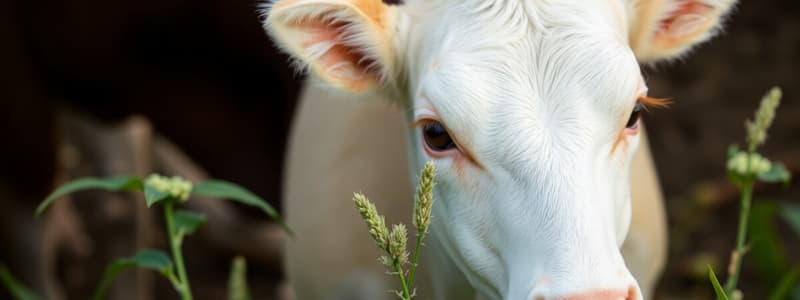Podcast
Questions and Answers
What is the primary focus of crop science?
What is the primary focus of crop science?
- Animal genetics
- Soil conservation methods
- Growing plants for food, fiber, and fuel (correct)
- Market trends in agribusiness
Which practice is an example of sustainable agriculture?
Which practice is an example of sustainable agriculture?
- Overusing chemical fertilizers
- Monoculture farming
- Crop rotation (correct)
- Intensive livestock farming
What is the main goal of precision agriculture?
What is the main goal of precision agriculture?
- Optimizing field-level management using technology (correct)
- Improving crop yield through better seed selection
- Maximizing the use of chemical pesticides
- Increasing livestock numbers for higher production
What does integrated pest management (IPM) primarily aim to achieve?
What does integrated pest management (IPM) primarily aim to achieve?
Which of the following factors does not directly impact soil erosion?
Which of the following factors does not directly impact soil erosion?
What is a significant benefit of genetic engineering in agriculture?
What is a significant benefit of genetic engineering in agriculture?
Which component is part of soil science?
Which component is part of soil science?
Which agricultural practice primarily helps in water conservation?
Which agricultural practice primarily helps in water conservation?
Study Notes
Overview of Agricultural Science
- Definition: Agricultural science is the study of farming and crop production, integrating biology, technology, environmental science, and economics.
- Importance: Essential for food production, sustainability, and managing agricultural resources.
Sub-disciplines
-
Crop Science: Focuses on growing plants for food, fiber, and fuel.
- Plant breeding
- Entomology
- Soil science
-
Soil Science: Studies soil as a natural resource.
- Soil fertility
- Soil composition and structure
- Soil conservation
-
Animal Science: Concerned with the breeding and management of livestock.
- Animal nutrition
- Animal physiology
- Animal genetics
-
Agronomy: Integrates soil science, plant genetics, and ecology.
- Crop management
- Agricultural practices
- Sustainable farming
-
Horticulture: Focuses on garden crops, fruits, vegetables, and ornamental plants.
- Plant propagation
- Pest management
- Landscape design
Key Concepts
- Sustainable Agriculture: Practices that do not exhaust resources and maintain biodiversity.
- Agroecology: Combines ecological principles with agricultural practices for improved productivity.
- Precision Agriculture: Use of technology (e.g., GPS, sensors) to optimize field-level management.
- Genetic Engineering: Modification of plant and animal genes to improve yield and disease resistance.
Agricultural Practices
- Irrigation: Methods include surface, drip, and sprinkler irrigation; critical for water-efficient crop production.
- Crop Rotation: Altering crops grown in a specific area to improve soil health and reduce pests.
- Integrated Pest Management (IPM): Combines biological control, cultural practices, and chemical methods for pest control.
Economic Aspects
- Market Trends: Influence of global markets on local farming practices.
- Agribusiness: Businesses involved in the production, processing, and distribution of agricultural products.
- Policy and Regulation: Government policies affecting agriculture, such as subsidies and land use regulations.
Environmental Impact
- Soil Erosion: Loss of soil due to wind, water, and agricultural practices; impacts fertility and productivity.
- Water Usage: Overuse and contamination of water supplies; critical for both crop irrigation and livestock.
- Biodiversity: Importance of maintaining diverse ecosystems for resilient agricultural systems.
Future Directions
- Biotechnology: Increased use of genetically modified organisms (GMOs) for enhanced productivity.
- Climate-Smart Agriculture: Adaptive practices aimed at increasing resilience to climate change.
- Urban Agriculture: Growing crops in urban settings to promote local food systems and reduce logistical impacts.
Agricultural Science Definition
- The study of farming and crop production, integrating biology, technology, environmental science, and economics.
Importance of Agricultural Science
- Essential for food production, sustainability, and managing agricultural resources.
Crop Science
- Focuses on growing plants for food, fiber, and fuel.
- Includes plant breeding, entomology, and soil science.
Soil Science
- Studies soil as a natural resource.
- Focuses on soil fertility, composition, structure, and conservation.
Animal Science
- Concerned with the breeding and management of livestock.
- Includes animal nutrition, physiology, and genetics.
Agronomy
- Integrates soil science, plant genetics, and ecology.
- Focuses on crop management, agricultural practices, and sustainable farming.
Horticulture
- Focuses on garden crops, fruits, vegetables, and ornamental plants.
- Includes plant propagation, pest management, and landscape design.
Sustainable Agriculture
- Practices that do not exhaust resources and maintain biodiversity.
Agroecology
- Combines ecological principles with agricultural practices for improved productivity.
Precision Agriculture
- Uses technology (e.g., GPS, sensors) to optimize field-level management.
Genetic Engineering
- Modification of plant and animal genes to improve yield and disease resistance.
Irrigation
- Methods include surface, drip, and sprinkler irrigation.
- Critical for water-efficient crop production.
Crop Rotation
- Altering crops grown in a specific area to improve soil health and reduce pests.
Integrated Pest Management (IPM)
- Combines biological control, cultural practices, and chemical methods for pest control.
Market Trends
- Influence of global markets on farming practices.
Agribusiness
- Businesses involved in the production, processing, and distribution of agricultural products.
Policy and Regulation
- Government policies affecting agriculture, including subsidies and land use regulations.
Soil Erosion
- Loss of soil due to wind, water, and agricultural practices.
- Impacts fertility and productivity.
Water Usage
- Overuse and contamination of water supplies.
- Critical for crop irrigation and livestock.
Biodiversity
- Importance of maintaining diverse ecosystems for resilient agricultural systems.
Biotechnology
- Increased use of genetically modified organisms (GMOs) for enhanced productivity.
Climate-Smart Agriculture
- Adaptive practices aimed at increasing resilience to climate change.
Urban Agriculture
- Growing crops in urban settings to promote local food systems and reduce logistical impacts.
Studying That Suits You
Use AI to generate personalized quizzes and flashcards to suit your learning preferences.
Description
This quiz covers the fundamental aspects of agricultural science, including its definition, importance, and various sub-disciplines such as crop science, soil science, and animal science. It is essential for understanding modern farming practices and the sustainable management of agricultural resources.



